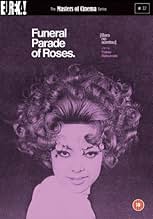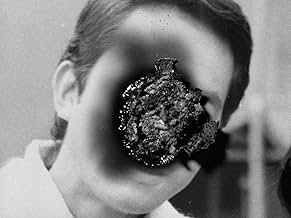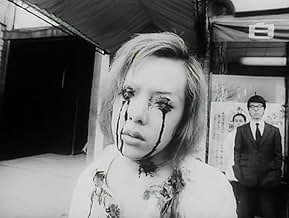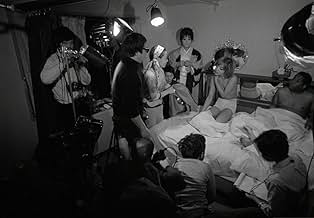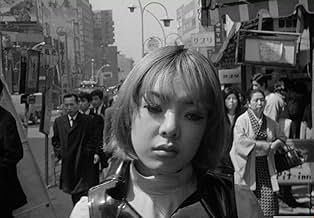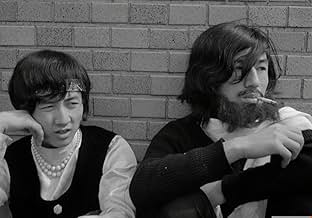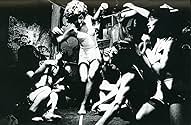VALUTAZIONE IMDb
7,7/10
8005
LA TUA VALUTAZIONE
Le prove e le tribolazioni di Eddie e altri travestiti in Giappone.Le prove e le tribolazioni di Eddie e altri travestiti in Giappone.Le prove e le tribolazioni di Eddie e altri travestiti in Giappone.
- Regia
- Sceneggiatura
- Star
- Director
- Sceneggiatura
- Tutti gli interpreti e le troupe
- Produzione, botteghino e altro su IMDbPro
Recensioni in evidenza
I am not a fan of avent-garde films, which I find are often pretentious and silly, but I enjoyed "Funeral Parade of Roses", primarily because I found the main character "Eddie" (played by Shinnosuke Ikehata aka "Peter") fascinating. The film is a non-linear composite of drama and documentary like vérité punctuated by abstract inclusions (jump cuts to stills, substitution splices, etc), some of which are more effective than others. Supposedly, Kubrick drew inspiration for "A Clockwork Orange" (1971) from this film and there are certainly some similarities (at one point Eddie looks straight at the camera through up cast eyes in a scene that reminded me of the iconic opening shot of "Alex" in Kubrick's film). Lacking much of a plot, "Funeral Parade of Roses" primarily peers into Tokyo's gay scene and follows Eddie, a transvestite 'bar girl' as he moves amoungst his friends (including pretentious auteur 'Guevara') in hopes of luring boss Gonda (Yoshio Tsuchiya) from rival, and bar 'Madame', Leda (Osamu Ogasawara), perhaps becoming 'Madame' himself. The black-and white cinematography is lovely, the characters intriguing and photogenic and the direction, for the most part, excellent (the interminable toking scene not withstanding). While the film is nonlinear, there is a traditional 'climactic' sequence at the end that is well worth waiting for and explains many of the references to the film being an Oedipal myth. Not to everybody's tastes but well worth trying out.
If you really are looking for a good time in a movie theatre - watch this movie ! It has been said that some of Kubrick's visual and sonic ideas for "Clockwork Orange" were inspired by this movie; after having seen it, i'm more than convinced that this is true.
This movie offers a lot of cinematic ideas and it uses surprising ways to make a point within a story.
What is the reason that films with a spirit and mood like that have vanished from the screen ? Have the politics in the movie industry really become so strict ? This movie watched nowadays has (but maybe had always) a subversive feel to it, why is that ?
It definitely offers something different and therefore would be very welcome in movie theatres and videostores around the world to free us from all the uninspired formula movies.
This movie offers a lot of cinematic ideas and it uses surprising ways to make a point within a story.
What is the reason that films with a spirit and mood like that have vanished from the screen ? Have the politics in the movie industry really become so strict ? This movie watched nowadays has (but maybe had always) a subversive feel to it, why is that ?
It definitely offers something different and therefore would be very welcome in movie theatres and videostores around the world to free us from all the uninspired formula movies.
In a key moment around the half-way mark in Toshio Matsumoto's Funeral Parade of Roses, the young protagonist Eddie, a transsexual working in Tokyo, stabs his mother's lover and then his mother himself. Matsumoto's film is full of Oedipal subtexts, but here Eddie kills his mother to (perhaps) get to his father, so it is the reverse of the Oedipus story. In fact, most of the film is 'backwards' in the traditional sense, full of narrative tricks, contrasting styles and shifts in tone, moving from melodrama to documentary to horror with each scene.
Eddie (played by real-life queen Pita) is a drag-queen working at a top Tokyo underground club ran by Gonda (Yoshio Tsuchiya). Eddie is the top attraction at the club, much to the envy of ageing madam Leda (Osamu Ogasawara). When Gonda starts a secret affair with Eddie, Leda finds out and plans to hurt and disfigure Eddie in her jealousy. Running alongside this fictional storyline are various interviews with the real-life queens who act in the film, who offer insights about life in Tokyo for queens and how the film will represent them.
There was a huge boom in Japan in the 1960's of films now known as Japanese New Wave. Funeral Parade of Roses is certainly one of the most daring and technically innovative, stripping back genre (and even cinematic) conventions to create one of the most important films in the history of Gay Cinema. This leads to an occasionally confusing and head- spinning film, that can switch quickly from a generic love scene to a moment of avant-garde (an argument between two queens have them shouting at each other with speech bubbles) to a bloody set-piece. One of the most inspirational films to come out of Japan, this was a favourite of Stanley Kubrick's, and no doubt the scenes that are played out in fast- forward were an influence on A Clockwork Orange (1971). Uncompromising, unapologetic cinema.
www.the-wrath-of-blog.blogspot.com
Eddie (played by real-life queen Pita) is a drag-queen working at a top Tokyo underground club ran by Gonda (Yoshio Tsuchiya). Eddie is the top attraction at the club, much to the envy of ageing madam Leda (Osamu Ogasawara). When Gonda starts a secret affair with Eddie, Leda finds out and plans to hurt and disfigure Eddie in her jealousy. Running alongside this fictional storyline are various interviews with the real-life queens who act in the film, who offer insights about life in Tokyo for queens and how the film will represent them.
There was a huge boom in Japan in the 1960's of films now known as Japanese New Wave. Funeral Parade of Roses is certainly one of the most daring and technically innovative, stripping back genre (and even cinematic) conventions to create one of the most important films in the history of Gay Cinema. This leads to an occasionally confusing and head- spinning film, that can switch quickly from a generic love scene to a moment of avant-garde (an argument between two queens have them shouting at each other with speech bubbles) to a bloody set-piece. One of the most inspirational films to come out of Japan, this was a favourite of Stanley Kubrick's, and no doubt the scenes that are played out in fast- forward were an influence on A Clockwork Orange (1971). Uncompromising, unapologetic cinema.
www.the-wrath-of-blog.blogspot.com
I didn't know anything about this movie when a friend of mine recommended it in the most enthusiastic way. The guy is a a very young movie buff, with a keen interest in quality movies (experimental, avant-garde, new wave, independent, iconoclast, unorthodox, stuff like that). I share his interests (despite my old age), and any discussion we have is real brainstorming. Two days ago he told me about planning to organize kind of jam-session with friends of his age to watch a battery of movies (I declined the invitation: No Country for Old Men). "Funeral Procession of Roses" was mentioned in this context.
Back home I found references about the movie on the web, then a copy of the film on you Tube, with Spanish subtitles. I stayed long in night to watch the movie. Really a great cinematic experience. As I said, I didn't know anything about it, nor about director Toshio Matsumoto. A movie from 1969, belonging to the "Nuberu Bagu", the Japanese New Wave, recalling all I knew about that period in the history of Nippon cinema, first of all bringing back to my memory the four or five movies by Oshima that I had the chance to watch.
You say "Nuberu Bagu", you say Buñuel on the steroids; and the film of Matsumoto is no exception: the ending scene of "Funeral Procession of Roses" is a direct reference to the beginning of "Un Chien Andalou": tribute paid to the famous scene from Buñuel, also creative re-enactment, also shifting the sense of it toward new territory, toward Buñuel encountering Aeschylus and Sophocles on a street in Tokyo among busy passers-by.
It's not a movie for the sissies, this "Funeral Procession of Roses". It acts on multiple strata, and each strata is challenging. A movie solidly placed in the underground culture, exploring the gay universe - a night club of sorts with two drag queens in bitter conflict, the club owner trying to keep the balance between them. All this approached with a raw Neorealist eye, à la Fellini, à la Juan Antonio Bardem. Over the plot comes a documentary, every now and then the action is stopped and one or other of the actors is interviewed: a movie about trans genders, played by trans genders, how do they view their sexual condition, how do they relate with the movie they play in. Is it a documentary about a gay movie on the making? Is it just a documentary about the LGBT condition, using feature sequences to emphasize some points? Actually everything in the movie is left in an indeterminate state, and this is on purpose. Is it a feature or a documentary? Are the actors playing actors, a movie within a movie? Are those guys trans genders, or girls impersonating trans genders, or what? Is the paradigm of Oedipus (re-enacted in the movie in a quirky way) just what we know it is? Is this a supremely iconoclastic interpretation of Augusto Monterosso's "La cucaracha soñadora" - moved in a Tokyo gay bar of the sixties? ("There was a cockroach named Gregor Samsa who was dreaming he was a cockroach named Franz Kafka who was dreaming he was an author writing some story about a clerk named Gregor Samsa who was dreaming he was a cockroach"). Gosh, no!
And I think this is the ultimate meaning of the Funeral Procession of Roses: it speaks us about the frailty of our certitudes: be it reality versus illusion of reality, be it gender strict determination, be it our ultimate identity. "Mis circunstancias son como las suyas. Ésa es una de las razones"... Yep, not for the sissies.
Back home I found references about the movie on the web, then a copy of the film on you Tube, with Spanish subtitles. I stayed long in night to watch the movie. Really a great cinematic experience. As I said, I didn't know anything about it, nor about director Toshio Matsumoto. A movie from 1969, belonging to the "Nuberu Bagu", the Japanese New Wave, recalling all I knew about that period in the history of Nippon cinema, first of all bringing back to my memory the four or five movies by Oshima that I had the chance to watch.
You say "Nuberu Bagu", you say Buñuel on the steroids; and the film of Matsumoto is no exception: the ending scene of "Funeral Procession of Roses" is a direct reference to the beginning of "Un Chien Andalou": tribute paid to the famous scene from Buñuel, also creative re-enactment, also shifting the sense of it toward new territory, toward Buñuel encountering Aeschylus and Sophocles on a street in Tokyo among busy passers-by.
It's not a movie for the sissies, this "Funeral Procession of Roses". It acts on multiple strata, and each strata is challenging. A movie solidly placed in the underground culture, exploring the gay universe - a night club of sorts with two drag queens in bitter conflict, the club owner trying to keep the balance between them. All this approached with a raw Neorealist eye, à la Fellini, à la Juan Antonio Bardem. Over the plot comes a documentary, every now and then the action is stopped and one or other of the actors is interviewed: a movie about trans genders, played by trans genders, how do they view their sexual condition, how do they relate with the movie they play in. Is it a documentary about a gay movie on the making? Is it just a documentary about the LGBT condition, using feature sequences to emphasize some points? Actually everything in the movie is left in an indeterminate state, and this is on purpose. Is it a feature or a documentary? Are the actors playing actors, a movie within a movie? Are those guys trans genders, or girls impersonating trans genders, or what? Is the paradigm of Oedipus (re-enacted in the movie in a quirky way) just what we know it is? Is this a supremely iconoclastic interpretation of Augusto Monterosso's "La cucaracha soñadora" - moved in a Tokyo gay bar of the sixties? ("There was a cockroach named Gregor Samsa who was dreaming he was a cockroach named Franz Kafka who was dreaming he was an author writing some story about a clerk named Gregor Samsa who was dreaming he was a cockroach"). Gosh, no!
And I think this is the ultimate meaning of the Funeral Procession of Roses: it speaks us about the frailty of our certitudes: be it reality versus illusion of reality, be it gender strict determination, be it our ultimate identity. "Mis circunstancias son como las suyas. Ésa es una de las razones"... Yep, not for the sissies.
A pretty unique film, one which represents transvestite characters in an adaptation of a classical Greek story, executed in a new wave film style. It's a lot, and there were times while watching it that I thought director Toshio Matsumoto was trying to do just a little too much. If you're wondering a bit during silly scenes like the joint being passed around, or what the point of all those butts are, one sporting a protruding rose, well, I would just say 'bare' with it, because it pulls together well over the back half. The lead character, Eddie (short for Oedipus, get it?), is striking, and frankly I thought Peter was a big part of what made the film successful.
The film felt a little close to making this culture a part of a carnival, e.g. with fight scenes given to us in fast motion and with circus music, and when the interviewer asks questions of characters/actors in condescending ways. There are gay sex scenes which seems quite daring for the period, though Matsumoto seems to want to reassure us that nothing's actually happening by suddenly showing the film crew around the actors, and how the whole thing is just being simulated. I worried a little bit that the culture was just being used for shock value along with the new wave style, and compounded by the perversion of the original story.
However, overall I think we see a sympathetic humanization here, something that's pretty amazing for 1969. The characters suffer the pangs of love and jealousy as anyone else would, and also hardships growing up that are all their own. Masks and mirrors play a big role in the film, but what I loved was that while these characters are wearing masks maybe to conceal their inner demons and the pain in their lives, they're not wearing them or pretending to be something they're not by dressing as women. Ironically, we see that they are being true to themselves, and in that sense, wearing less of a mask by doing so. The best moments for me were in the candid, honest replies to the interview questions, and I wish there would have been more of this. The imagery at the end is also especially powerful, and seems to amplify the isolation of this poor young man from the society around him, who simply gape in astonishment.
The film felt a little close to making this culture a part of a carnival, e.g. with fight scenes given to us in fast motion and with circus music, and when the interviewer asks questions of characters/actors in condescending ways. There are gay sex scenes which seems quite daring for the period, though Matsumoto seems to want to reassure us that nothing's actually happening by suddenly showing the film crew around the actors, and how the whole thing is just being simulated. I worried a little bit that the culture was just being used for shock value along with the new wave style, and compounded by the perversion of the original story.
However, overall I think we see a sympathetic humanization here, something that's pretty amazing for 1969. The characters suffer the pangs of love and jealousy as anyone else would, and also hardships growing up that are all their own. Masks and mirrors play a big role in the film, but what I loved was that while these characters are wearing masks maybe to conceal their inner demons and the pain in their lives, they're not wearing them or pretending to be something they're not by dressing as women. Ironically, we see that they are being true to themselves, and in that sense, wearing less of a mask by doing so. The best moments for me were in the candid, honest replies to the interview questions, and I wish there would have been more of this. The imagery at the end is also especially powerful, and seems to amplify the isolation of this poor young man from the society around him, who simply gape in astonishment.
Lo sapevi?
- QuizIl funerale delle rose (1969) gave Stanley Kubrick several visual and aural inspirations for his adaptation of Arancia meccanica (1971).
- BlooperTutte le opzioni contengono spoiler
- ConnessioniEdited from Ecstasis (1969)
- Colonne sonoreO du lieber Augustin
I più visti
Accedi per valutare e creare un elenco di titoli salvati per ottenere consigli personalizzati
- How long is Funeral Parade of Roses?Powered by Alexa
Dettagli
Botteghino
- Lordo in tutto il mondo
- 1114 USD
- Tempo di esecuzione
- 1h 45min(105 min)
- Colore
- Mix di suoni
- Proporzioni
- 1.37 : 1
Contribuisci a questa pagina
Suggerisci una modifica o aggiungi i contenuti mancanti



